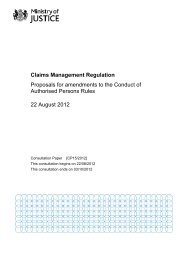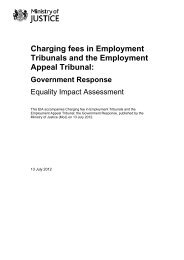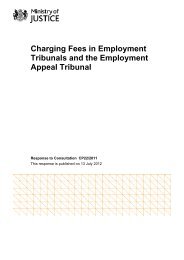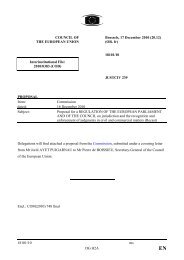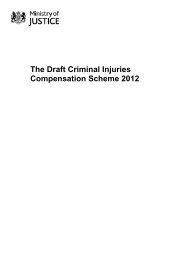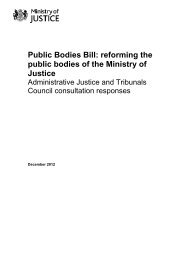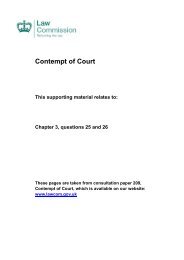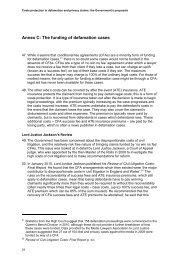Appointments and Diversity 'A Judiciary for the ... - Ministry of Justice
Appointments and Diversity 'A Judiciary for the ... - Ministry of Justice
Appointments and Diversity 'A Judiciary for the ... - Ministry of Justice
You also want an ePaper? Increase the reach of your titles
YUMPU automatically turns print PDFs into web optimized ePapers that Google loves.
<strong>Appointments</strong> <strong>and</strong> <strong>Diversity</strong> A <strong>Judiciary</strong> <strong>for</strong> <strong>the</strong> 21st Century’<br />
Response to public consultation<br />
is not currently utilised very <strong>of</strong>ten. It will <strong>the</strong>re<strong>for</strong>e be important to work with <strong>the</strong><br />
judiciary to ensure that opportunities <strong>for</strong> part-time working are promoted <strong>and</strong> that any<br />
operational or cultural constraints are addressed.<br />
141. In response to comments received during our consultation we intend to extend <strong>the</strong><br />
principle <strong>of</strong> salaried part-time working to <strong>the</strong> UK Supreme Court by amending <strong>the</strong><br />
maximum number <strong>of</strong> judges <strong>of</strong> <strong>the</strong> Supreme Court, so that it is specified as<br />
‘full-time equivalents’.<br />
142. There was support in <strong>the</strong> consultation responses <strong>for</strong> applying <strong>the</strong> Equality Act 2010<br />
“tipping point” provision to judicial appointments. We will make legislative change<br />
to make clear that where two applicants <strong>for</strong> judicial <strong>of</strong>fice are assessed as<br />
being <strong>of</strong> equal merit, positive action can be taken to favour one <strong>of</strong> judges on<br />
<strong>the</strong> basis <strong>of</strong> improving diversity. In response to consultation <strong>and</strong> in <strong>the</strong> House <strong>of</strong><br />
Lords Constitution Committee Report <strong>the</strong>re was concern that in applying “<strong>the</strong> tipping<br />
point” <strong>the</strong>re should not be any diminishing <strong>of</strong> <strong>the</strong> primacy <strong>of</strong> appointment being based<br />
on merit. We will <strong>the</strong>re<strong>for</strong>e make this legislative change in such a way as not to<br />
remove <strong>the</strong> current legislative provision that appointment be based solely on merit. In<br />
practice this will mean that <strong>the</strong> two c<strong>and</strong>idates must be judged to be <strong>of</strong> equal merit<br />
be<strong>for</strong>e <strong>the</strong> “tipping point” can apply.<br />
143. We are not now proposing to take <strong>for</strong>ward <strong>the</strong> consultation proposal to limit fee<br />
paid terms to three terms <strong>of</strong> five years. The consultation responses highlighted a<br />
number <strong>of</strong> concerns with regard to <strong>the</strong> likely business impact <strong>of</strong> a 15 year limit on fee<br />
paid judiciary in particular in relation to some <strong>of</strong> <strong>the</strong> specialist judiciary where<br />
recruitment challenges exist. The responses also highlighted that fee-paid work can<br />
facilitate some judges from a more diverse background being able to take judicial<br />
roles, <strong>for</strong> example those with caring responsibilities can more easily juggle <strong>the</strong><br />
dem<strong>and</strong>s <strong>of</strong> a fee-paid position than a full-time post. The purpose <strong>of</strong> <strong>the</strong> proposal had<br />
been to try <strong>and</strong> ensure that fee-paid positions were regularly refreshed to provide<br />
opportunities <strong>for</strong> new judges to gain experience be<strong>for</strong>e applying <strong>for</strong> salaried positions.<br />
This remains an aim <strong>and</strong> we will conduct fur<strong>the</strong>r analysis <strong>of</strong> <strong>the</strong> use <strong>of</strong> fee-paid roles<br />
to determine how this can be achieved most effectively.<br />
Deliver speed <strong>and</strong> quality <strong>of</strong> service to applicants, <strong>the</strong> courts <strong>and</strong> tribunals <strong>and</strong><br />
value <strong>for</strong> money to <strong>the</strong> taxpayer<br />
144. There was general support <strong>for</strong> <strong>the</strong> role <strong>of</strong> <strong>the</strong> JAC. There was also little clear support<br />
<strong>for</strong> a reduction in <strong>the</strong> number <strong>of</strong> commissioners now, although <strong>the</strong>re was an<br />
appreciation that moving <strong>the</strong> detail <strong>of</strong> <strong>the</strong> composition <strong>of</strong> <strong>the</strong> Commission to<br />
secondary legislation would provide flexibility to meet operational needs.<br />
145. Our original proposal in <strong>the</strong> consultation document to reduce <strong>the</strong> number <strong>of</strong><br />
Commissioners to nine was based on <strong>the</strong> findings <strong>of</strong> <strong>the</strong> judicial appointments <strong>and</strong><br />
judicial arms length bodies review undertaken in November 2010. Overall, whilst,<br />
based on <strong>the</strong> consultation responses, we do not consider that <strong>the</strong>re is a strong<br />
argument to reduce <strong>the</strong> number <strong>of</strong> Commissioners now, it would be beneficial to<br />
allow <strong>for</strong> a greater degree <strong>of</strong> flexibility in <strong>the</strong> future on <strong>the</strong> numbers <strong>of</strong> Commissioners<br />
to respond to business needs <strong>and</strong> potentially achieve greater efficiency. The same<br />
arguments also apply to having flexibility to amend <strong>the</strong> composition <strong>of</strong> <strong>the</strong><br />
Commissioners to meet changes in business need. We are <strong>the</strong>re<strong>for</strong>e proposing<br />
that legislation should be amended to provide a power to set <strong>the</strong> number <strong>and</strong><br />
composition <strong>of</strong> <strong>the</strong> JAC in secondary legislation, but that key principles<br />
31



